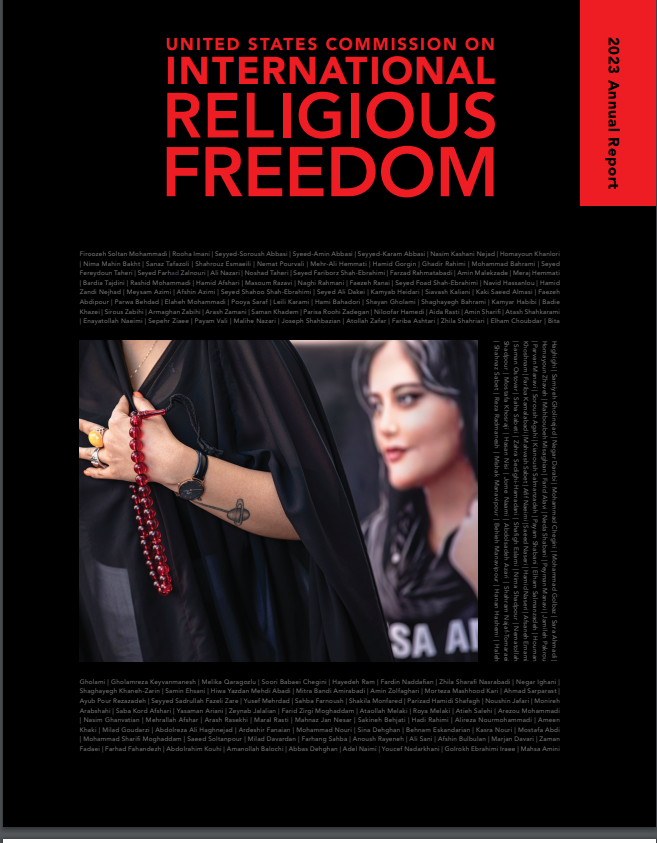WASHINGTON, D.C. – The U.S. Commission on International Religious Freedom released its annual report last week noting that the conditions for religious freedom are “worsening” around the world. The USCIRF is charged specifically with the mission “To advance international freedom of religion or belief, by independently assessing and unflinchingly confronting threats to this fundamental right.”
The Annual Report highlights the countries and entities that, in USCIRF’s view, merit a series of designations to underscore concerns over religious persecution. The report is intended to focus U.S. policymakers’ attention on the worst violators of religious freedom globally. In last year’s report, the USCIRF identified “regression” in countries such as Afghanistan, China, Cuba, Iran, Nicaragua, and Russia.
The cover of the report is a protester holding a rosary and a placard with a picture of Mahsa Amini, the 22-year-old Iranian woman who fell into a coma and died after being arrested in Tehran by the morality police for allegedly violating the country’s hijab rules. Her death sparked weeks of violent protests across Iran.

Cover of the 2023 Report- USCIRF
The image is intended to serve not only as a reminder of the violence directed against Mahsa Amini but also for “Iranian women and girls who have been at the forefront of the ongoing protests for greater freedom in Iran and have faced extreme and violent
consequences for their participation. Iranian authorities’ systematic use of sexual and gender-based violence against them represents a purposeful weaponization of religious conceptions of purity, modesty, and gender hierarchy in an effort to shame Iranians out of peacefully asserting their fundamental right to religious freedom.”
The report “sounds the alarm regarding the deterioration of religious freedom conditions in a range of other countries and provides policy recommendations to the U.S. government to respond to violations occurring in these places.” The report also directs the president to report U.S. efforts to prevent mass atrocities to Congress annually.
The 2023 report recommends the re-designation of Burma, China, Cuba, Eritrea, Iran, Nicaragua, North Korea, Pakistan, Russia, Saudi Arabia, Tajikistan, and Turkmenistan as Countries of Particular Concern (CPC). It further recommended adding Afghanistan, India, Nigeria, Syria, and Vietnam to the list. “Countries of particular concern” or CPC is the strongest of those designations and identifies countries that engages in or tolerates “particularly severe” egregious violations of religious freedom. The CPC is the highest level of concern and identifies “countries where the government engages in or tolerates ‘particularly severe’ violations of religious freedom.”
Such governments are accused of numerous violations. These violations include (A) torture or cruel, inhuman, or degrading treatment or punishment; (B) prolonged detention without charges; (C) causing the disappearance of persons by the abduction or clandestine detention of those persons; or (D) other flagrant denials of the right to life, liberty, or the security of persons.
In December of last year, the USCIRF accused the U.S. State Department of ignoring the Commission’s concerns for political motives.
“There is no justification for the State Department’s failure to recognize Nigeria or India as egregious violators of religious freedom, as they each clearly meet the legal standards for designation as CPCs. USCIRF is tremendously disappointed that the Secretary of State did not implement our recommendations and recognize the severity of the religious freedom violations that both USCIRF and the State Department have documented in those countries,” the commission’s chairperson, Nury Turkel, said in a statement. “The State Department’s own reporting includes numerous examples of particularly severe religious freedom violations in Nigeria and India,” he added.

Logo of the United States Commission on International Religious Freedom (USCIRF)
The Entities of Particular Concern (EPC) designation is similar to the CPC designation but applied to non-state actors. The report lists the following non-state actors with EPC designation: al-Shabaab, Boko Haram, Hay’at Tahrir al-Sham (HTS), the Houthis, Islamic State in the Greater Sahara (ISGS), Islamic State in West Africa Province (ISWAP also referred to as ISIS-West Africa), Jamaat Nasr al-Islam wal Muslimin (JNIM), the Taliban, and the Wagner Group.
The report listed 11 nations on the special watch list: Algeria, Azerbaijan, Central African Republic (CAR), Egypt, Indonesia, Iraq, Kazakhstan, Malaysia, Sri Lanka, Turkey, and Uzbekistan.
The report urged the Biden administration to “continue to coordinate international action to lift the veil of impunity under which Iran’s leadership continues to operate.” The report also highlighted Cuba and Nicaragua adding that “in Cuba, religious freedom conditions in 2022 worsened considerably, with the government seeking total dominance over religious life in the country.”
The report also urged the Biden administration to “fully implement the Elie Wiesel Genocide and Atrocities Prevention Act of 2018 to develop policies to enhance the capacity of the United States to prevent and respond to atrocities worldwide, including those against religious communities.”
This bill directs the Department of State to provide additional training for Foreign Service Officers assigned to a country experiencing or at risk of mass atrocities, such as genocide or war crimes. The training shall include instruction on recognizing patterns of escalation and early signs of potential atrocities, and methods of preventing and responding to atrocities.
The Wild Hunt is not responsible for links to external content.
To join a conversation on this post:
Visit our The Wild Hunt subreddit! Point your favorite browser to https://www.reddit.com/r/The_Wild_Hunt_News/, then click “JOIN”. Make sure to click the bell, too, to be notified of new articles posted to our subreddit.